Lizard’s blood after military jet flyovers had higher levels of ketone and corticosterone.
JULY 29, 2024 01:05
While many publications have focused on the human impact of Hamas’s October 7 attacks, and the ongoing hostage situation, Hezbollah’s continued rocket barrages and the economic consequences of the Houthis maritime attacks, a new Tel Aviv University study has found that Israeli wildlife is also suffering.
The peer-reviewed Israeli study, published in the esteemed journal Ecology,chronicled the various ways that the war has impacted both domestic and wild animals.
Wildlife populations in Israel have experienced a loss of habitat from direct missile attacks, and the fires in northern Israel ignited by Hezbollah attacks, and “exploitation by displaced people.” The sudden loud noises that come from military activity are also stressors for domestic and wild animals. This TAU study focused on the exact impact of military noise on animals.Top ArticlesRead More
Israelis desperately needed something to celebrate, and our Olympians gave us just that
The impact military noise has on Israel’s wildlife
Previous studies have shown that jet flyovers can increase the heart rate of mammals – but the study failed to consider reptiles.
While a 2016 study found that reptilian reaction to anthropogenic noise was minimal, the lizard Aspidoscelis neotesselatus was found in this study to suffer stress responses to military jet flyovers.

The lizard’s blood after flyovers had higher levels of ketone and corticosterone. This led to the observed lizards spending more time foraging for food, so that it could compensate for energy lost during its reaction.
A 2021 study on the blind snake Xerotyphlopssyriacus was also shown to have increased respiration during times of rocket attacks – again proving that reptiles are not immune from the impact of the war.
After the researchers at TAU began observing Stenodactylussthenodactylus geckos in 2023, rockets began to target Tel Aviv. It was during this unplanned influencing factor that the researchers noticed that the gecko’s heart rates were 2.3 ± 0.3 times higher immediately after the explosion for up to 30 minutes compared to the 4 hours after the explosion. The metabolic rates of the geckos were also 1.6 times higher 30 minutes after the explosion than 4 hours after them.
Researchers comment on their findings
“We assume the increased metabolic costs indicate an acute stress response, initiated by the loud noise or vibrations from the explosions and continuing, to a lesser degree, several hours after. ,” the researchers explained. “…Our data suggest[s] that for geckos the detrimental effects may last for as long as hostilities do. It is also worth noting that we recorded the responses inside a sheltered, windowless room with concrete walls. In the wild, animals are much more exposed and may be affected by explosions more strongly and across a larger area.”
Prof. Shai Meiri explained, “The most tragic aspect of war is the loss of human life, among both soldiers and civilians. However, animals are also severely affected, both directly and indirectly, in ways that may threaten their survival. A few weeks before October 7, we began working on a long-term study to measure the rate of energy consumption of small ground geckos of the species Stenodactylus sthenodactylus. We obviously did not foresee the outbreak of the war, but unintentionally, we recorded the energy consumption of five geckos during the rocket barrages launched into Tel Aviv in the first month of the war.”
Stay updated with the latest news!
Subscribe to The Jerusalem Post Newsletter
Prof. Eran Levin added, “A state of stress is detrimental to both humans and animals. To compensate for the increase in oxygen consumption and depletion of energy reserves, animals need to eat more. Even if they manage to find food, in the process they expose themselves to predators and lose opportunities to reproduce. In a situation of ongoing conflict, such as the current reality in Gaza, the Gaza Envelope, and along the Israeli-Lebanese border, the metabolic cost can be significant and have a real impact on the energy reserves and activity periods of reptiles and other animals. This can exacerbate their conservation status, especially for species that are already endangered.”
Shahar Dubiner concluded, “Our research was conducted in a laboratory at Tel Aviv University and pertained to the reverberations of explosions from interceptions in the Tel Aviv area. However, given the unequivocal results showing symptoms of stress, we can infer that animals that are in the immediate conflict zones in the south and north of the country, where the intensity and frequency of fire are much higher, suffer from significantly more severe stress and anxiety symptoms that may endanger their lives.”




